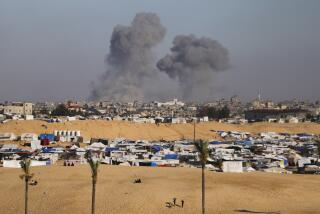THE SECRET DEBATE ON BOSNIA : Battling Over Arms
- Share via
The Clinton administration’s desire to bolster the Bosnian army without direct U.S. involvement led over time to both a secret Iranian arms pipeline and a secret debate about encouraging other countries to supply weapons:
1992
March: War breaks our after Bosnian government declares independence and Bosnian Serbs (who want union with Serbia) revolt. The U.N. applies arms embargo against all sides, but Serbs have access to Yugoslav Army supplies.
September: Iran sends a planeload of weaponry to Croatia for shipment to Bosnia; the Bush Administration objects, and the plane is turned back.
1993
May: President Clinton proposes lifting arms embargo on Bosnia-Herzegovina, but European allies object.
August: After Iran and other countries secretly begin sending weapons to Bosnia through Croatia, fighting between Bosnian Croats and Bosnian Muslims stops the shipments.
December: U.S. Ambassador Peter W. Galbraith begins exploring the idea of seeking “third country” arms donations for Bosnia.
1994
March: Bosnia and Croatia agree on a federation, ending Muslim-Croat fighting and making overland arms shipments possible again. Galbraith suggests seeking third-country aid, but the idea is not approved.
April: Croatia secretly proposes allowing large-scale Iranian arms shipments through its territory into Bosnia. President Clinton decides not to object to the plan, a decision some officials later describe as “a green light.”
May: Iranian Boeing 747 transports begin arriving in Croatia with weapons and ammunition for Bosnia; some also carry Iranian military trainers for the Bosnian military. Iranian Prime Minister Ali Akbar Velayati visits Sarajevo and wins praise from Bosnian President Alija Izetbegovic for helping with the war effort.
September: Assistant Secretary of State Richard C. Holbrooke proposes encouraging third countries to supply weapons to Bosnia. State Department legal advisers study ways this could be done without notifying Congress of a covert action.
November: National Security Adviser Anthony Lake and Secretary of State Warren Christopher turn down Holbrooke’s proposal, saying it could touch off a crisis with the allies.
1995
July: Bosnian Serb forces overrun Srebrenica and Zepa, Bosnian Muslim towns that the UN had declared “safe areas”; thousands of Muslims are massacred.
December: Bosnia, Croatia and Serbia sign the Dayton peace agreement, dividing the country and ending the war. Under the agreement, Bosnia agrees that all Iranian and other foreign forces will leave; NATO officials estimate some 2,000 foreign Muslim guerrillas in the country.
1996
January: Even as 20,000 U.S. peacekeeping troops deploy in Bosnia, Iran sends one more shipment of weapons and equipment. NATO officials say an estimated 200 Islamic guerrillas are still in the country.
February: NATO troops raid an Iranian-run terrorist training base in northern Bosnia and arrest 10. The Clinton Administration presses the Bosnian government to send Iranian military and intelligence advisers home.
June: Clinton certifies that Iranian military units have left Bosnia, although an unknown number of individual Iranians remain in the country.
More to Read
Sign up for Essential California
The most important California stories and recommendations in your inbox every morning.
You may occasionally receive promotional content from the Los Angeles Times.














